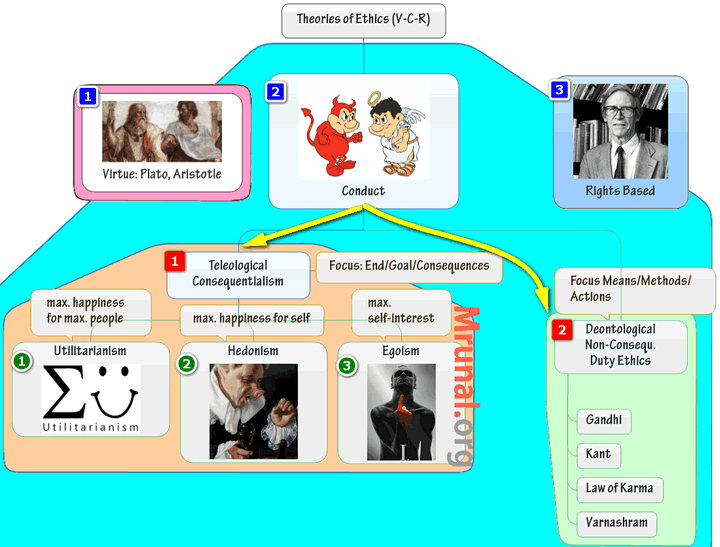- 3 Theories of Ethics (V-C-R)
- T1: Virtue Ethics
- T2: Conduct Ethics
- T3: Rights Based Ethics
- Case study: Sardar & ICS
- Case study: Ethical justification?
- Descriptive Questions (200 words each)
In the previous part (E1/P1), we looked at the types of judgments and pre-conditions for ethical scrutiny. In this part, we shall look at various theories of ethics, their merits and demerits.
3 Theories of Ethics (V-C-R)

| 1. Virtue Ethics | We judge a person’s virtue rather than his ‘conduct’ |
|---|---|
| 2.Conduct Ethics | We focus on ‘conduct’ rather than ‘person’. Further
|
| 3.Rights based Ethics | We give ‘rights’ to an individual. By xyz action, whether ‘rights’ of Mr.ABC are violated or not? On that parameter we’ll evaluate the action |
T1: Virtue Ethics
Focus more on virtues of the agent rather than consequences of his actions.
| Plato | Gave four Cardinal virtues of a “good man”: Wisdom, Courage, Temperance, Justice. |
| Aristotle |
|
T2: Conduct Ethics

| Teleological: Consequentialism | Deontological: Non-consequentialism |
|---|---|
| Examples: (1) Utilitarianism (2) Hedonism (3) Egoism | Examples (1) Varnashram dharma (2) law of Karma (3) religious scripture |
| Focus on “End/Goals/Consequences” |
|
| We’d have gained independence sooner, had we used violence against the British, and sooner we gained independence, faster we’d have become a 1st world country, so, use of violence is right, because end goal is noble. | Gandhi: We don’t want to gain independence through the use of violence. Because even though self-rule is a noble goal, violence is not the right ‘mean/instrument’ to achieve it. |
In both 1 and 2, we are focusing on the ‘end’. |
Kant: ‘Piracy’ as a ‘process’ is wrong. Because it violates the ‘right to property’. Anyways, we’ll discuss Kant in detail, in separate lecture on Syllabus topic #5: Moral Thinkers. |
| It’s ok to lie, to save someone’s life. | Difficult to justify because by lying we’re violating the other person’s ‘right to knowledge’. |
| — | Gives motivation to work, even when the result is uncertain or far away. e.g. Lord Krishna advising Arjun to fight in the war against the Kaurav. |
Anyways, it’s not important to get into finer nuances of each and every thinker and theory, we just have to see its application in case studies. So, while solving a case study, try to see it through the glasses of various theories.
T2A: Utilitarian Theory

Utilitarianism: if lynching makes 99 people happy and one person unhappy, is it good?
- Utilitarianism says you should work for greatest happiness for greatest number of people.
- A lynch mob kills a person believing a committed a crime.
- In this case say 100 people’s happiness minus 1 dead guy’s unhappiness = 99 units of happiness. So, is it an ethical action after all it led to maximum happiness for maximum people?
- Thus, in traditional “Act Utilitarianism” theory, lynch mob is justifiable.
- But, What if we make a rule out of above case I.e. “it is ok for people to kill other people.” If this rule is held valid then people will fear coming out of their home => economy & society will collapse=> not maximum good for maximum people.
- Therefore, by application of ‘Rule utilitarianism‘, we can prove “lynch mob” is ethically wrong.
| Altruism | You should put other people’s happiness before your own happiness. |
| Utilitarianism | You should strive for maximum people’s happiness, you’re also part of that crowd. So, your own happiness also matters as a unit. |
| Hedonism | You should maximize your own pleasure. |
| Merits | Demerits |
|---|---|
|
|
You’ve to keep the merits and demerits of each theory in mind, to ensure its proper application in case studies. E.g. if a case study involves minority rights or feminism, it may not be right to bend the utilitarianism principle to justify your stand.
T2B: Hedonism
- Hedonism says maximize your own pleasure/happiness.
- Among Indian philosophical schools, Charvaka school (Lokayatmat) advocates the same.
| Hedonism | Strive for Pleasure in all forms. Pleasure is the only truth of life. |
| Epicureanism |
|
| Gandhism | opposite of Hedonism because it preaches Complete control over senses, Bramhcharya. |
| Merit | Demerits |
|---|---|
|
|
| Promotes consumerism: boost to economy, employment generation. If everyone pursues ascetic lifestyle, who’ll provide food to the families of Chinese workers in apple factory? |
|
Moral Skepticism
According to Sophists (Greece) and Charvaka (Ancient India)- Ethical studies have no logical foundation because
- There are no fixed / objective criteria to separate moral act from immoral act, therefore, men are incapable of pursuing moral path
- If men pursue moral path, it’ll not be in their best ‘self-interest’.
- External forces determine a man’s action, so rarely a man has free will to choose his own action.
And this thought process leads to next theory of ethics – Egoism
T2C: Egoism
Egoism says maximize your own self-interest. Because (1) it is in human nature to avoid pain (2) it is irrational for a man to ignore his self-interest.
| Hedonism |
|
| Egoism |
|
- If parents sacrifice personal comforts for better education for children, if businessman gives part of his income in philanthropic causes, if a soldier sacrifices his life for protection of the nation -how does Egoism interprete them?
- Egoism says in all such actions are unconsciously selfish. e.g. philanthropy – hidden objective of gaining fame and respect. Although hidden motives are difficult to verify.
| Merit | Demerit |
|---|---|
| Egoism can lead to happiness for others also e.g. Mukesh Ambani’s decision to run a refinery at Jamnagar is driven by his own self-interest of profit generation but it also generates employment for lakhs of people. Capitalism works parallel to this. |
|
| You’re running a mobile company with profit motive, but at the same time you’re doing a social service by helping people in their need to ‘communicate’ with others. |
|
| If everyone tries to maximum his own self-interest, still there will be resistance by others, so ultimately an ‘equilibrium’ will be established wherein its win-win for all. | If everyone tries to maximize his own self-interest, it’ll lead to disaster. e.g. Prisoner’s dilemma |
The demerits of egoism encouraged Mathematician John Nash (movie: A beautiful mind), to work on “Game theory”. He died in 2015, May. So consider that homework, for some ethical case study involving game-theory.
Summary of Conduct Ethics
| Theory | Thinkers | Meaning | Merits | Demerits |
|---|---|---|---|---|
| Utilitarianism |
|
Maximum happiness for maximum no. of people |
|
|
| Hedonism |
|
Maximum pleasure for yourself |
|
|
| Egoism |
|
Maximum self-interest | Capitalism, trickle down | Prisoner’s dilemma |
T3: Rights Based Ethics
- We give ‘rights’ to an individual. By xyz action, whether ‘rights’ of Mr.ABC are violated or not? On that parameter we’ll evaluate the action.
- In China, a person from rural area can’t move to Shanghai without permit. So, his right to self-development is violated.
- In N.Korea, ordinary citizens are denied internet service, so their right to knowledge id violated, although the State may justify it saying internet-ban is necessary for maintenance of law and order or to prevent the brainwashing of the North Koreans by Western powers.
- When “rights” are given, it imposes accountability on the government. e.g Freedom of expression =>Media => Check on corruption.
- Right to education => enlightened citizenry =>they exercise RTI and thereby make government answerable.
- Human rights: ensures feudalism doesn’t come back.
- So, How do we judge an action using rights based theory? Our thinking of rights based ethics begins with the liberalism.
| Negative Approach | Positive Approach |
|---|---|
|
|
John Rawls
Leading thinker of this school is John Rawls. As such not much point doing Ph.D on him, all you should remember is he tried to reconcile between Liberty (capitalism) and Equality (Communism)
| Liberty | give maximum liberty to people without encroaching on other people’s liberties. |
| Equality |
|
For Case studies, keep in mind- rights based approach should be used for major themes only e.g. speech, health, education. For trivial individualist things, e.g. ‘lying, stealing’ better to apply other theories for your answer.
Case study: Sardar & ICS
During the British era, ICS (Indian Civil services) officers were responsible for arrest and persecution of Sardar Patel and many other freedom fighters. Yet, after independence, Patel decided to continue ICS service under a new name “IAS” and retained those ICS officers in it, despite the opposition by the other members of Constituent assembly. Discuss the ethical dilemmas that Sardar Patel would have faced before arriving at this decision.
Case study: Ethical justification?
Is following course of action ethically justifiable? Yes / No and Why?
- It is ok to remove organs of a convict on death row without his consent, IF we transplant them to needy children from poor families.
- It is ok for government to run opium farms, provided they sell it to foreign countries use the money for benefit of the poor.
- We should legalize prostitution because it’ll lead to less exploitation of the women in the hands of pimps and policemen.
- Government should ban cigarettes and alcohol from movies since it influences young audience to begin smoking and drinking.
- Women in armed forces should be posted only in the desk jobs, since they’re physically less fit to serve in frontline field posts.
Descriptive Questions (200 words each)
- Discuss in brief, major theories of Ethics. Which of them, in your opinion, answers the moral Dilemma better than others?
- Utilitarianism, though logically consistent, has internal-contradictions. Do you agree? Justify your stand?
- Define “Betrayal”. Narrate a historic example of betrayal and discuss the underlying ethical currents.
- Moral value of an act is not wholly dependent on its consequences. Discuss with a historic example.
- A universal theory of Ethics is impossible to frame since the moral choices depend on culture, religion, region and time-period. Do you agree, Justify your stand.
- According to Charvaka and other moral sceptics- Ethics has no logical foundation and perception is the only source of knowledge. Do you agree, Justify your stand.
In the third part (E1/P3) we’ll look at values, role of family-society-Edu. Institutions in inculcating human values and ethics in public and private relations. Visit Mrunal.org/Ethics for more study material on Ethics.


![[Ethics] Leadership- Newzeland PM Jacinda Ardern resignation to keep work-life balance and overstress](https://mrunal.org/wp-content/uploads/2023/01/NZ-500x383.png)
![[Ethics WMD] Leadership Qualities- Mahua Moitra, Boris Johnson, Gotabaya Rajapaksa, Weekly Mrunal Digest from Jul week2-2022](https://mrunal.org/wp-content/uploads/2022/07/mahua-moitra-500x383.webp)
![[Ethics WMD] Attitude towards women- nonconsensual image, porn, right to privacy, abortion Weekly Mrunal Digest from Jul week1-2022](https://mrunal.org/wp-content/uploads/2022/07/pervert-500x383.jpg)
The moral dilemmas are different in each situation ..so it might be wrong to tell the theory which suits the best..but as a civil servant,,utilitarianism is more appropriate in practice for benefit of a larger section of society